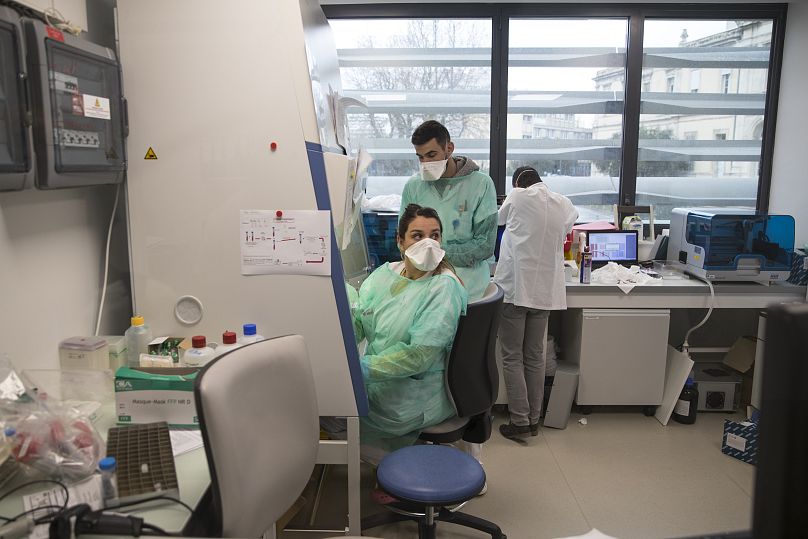We've spoken to the experts to get the best tips on avoiding COVID-19.
Cases of coronavirus have spread to more than 80 countries, infecting more than 95,000 people worldwide and killing over 3,000 (by Friday March 6).
The COVID-19 coronavirus is thought to "spread via respiratory droplets and exposure to human secretions, similar to the flu", Tania Elliott, a clinical instructor of medicine at NYU Langone Health told Euronews.
So how can you protect yourself against the virus? Here is a break down of some expert tips on how to protect yourself.
Wash hands properly
Experts say first and foremost that you should wash your hands properly.
People often touch their faces and can transfer germs to their nose, mouth or eyes, causing illness.
The French health ministry recommends washing your hands for 30 seconds, "by rubbing nails, fingertips, palm and the outside of the hands, knuckles and wrists" in order to prevent viruses.
The US Centres for Disease Control and Prevention (CDC) says that handwashing "can prevent about 30% of diarrhoea-related sicknesses and about 20% of respiratory infections," citing two studies on the topic.
They say that educating the general population on handwashing can reduce respiratory illness by 16-21%.
"The main guidance for preventing coronavirus infection if you're an ordinary person is not to wear a mask but to wash your hands constantly": Dr Leora Horwitz of New York University Langone Health. Watch the interview on Euronews Tonight in the video player above.
The World Health Organization recommends washing hands "after coughing or sneezing, when caring for the sick, before, during and after you prepare food, before eating, after toilet use, when hands are visibly dirty and after handling animals or animal waste."
If you cannot wash your hands with soap, you can use an alcohol-based hand sanitiser.
You should use a hand-sanitizer "after touching subway poles, stairway bars, and water fountains," Elliott said.
Minimise germ spread i.e. don't cough on other people
"There is no vaccine currently available, so we have to use what we call 'non-pharmaceutical measures', basically good hygiene and 'social distancing' (avoiding close contact with people who are sick, or with others, if you are sick yourself)," Dr Stephen Morse, a professor of epidemiology from Columbia's Mailman School of Public Health, told Euronews.
The World Health Organization says you should "follow good respiratory hygiene" around other people which includes covering your mouth with a tissue or your elbow. You should also dispose of used tissues.
The international body also suggests maintaining a distance of at least one metre between yourself and someone who might be sick to prevent potential virus-containing liquid droplets from coughs or sneezes from contaminating you.
They also suggest people try to avoid touching their eyes, nose and mouth, which is a common way of contracting a virus.
At work, people should keep workplaces clean and practice "regular and thorough" handwashing.
"If you are sick, stay home," says Dr Tania Elliott at NYU.
Elliott adds that people should "avoid finger foods or sandwich platters [and instead] opt for individually packaged items [as] it minimizes chances of germ spread".
Reporting symptoms early
It's important for health workers to detect cases early, so if you've been in contact with someone with the virus or to a region affected, you should report your symptoms to a health professional.
"Calling in advance will allow your health care provider to quickly direct you to the right health facility. This will also help to prevent the possible spread of COVID-19 and other viruses," the World Health Organization says.
Many cases of this virus have been mild, meaning that most people can self-isolate to treat the virus and consult with medical professionals without infecting others in a hospital.
Elliott proposes a "telehealth visit over in-person care if you are feeling sick" to help further limit infections.
But it's still a very small percentage of the world that has COVID-19, so although governments are working to contain further spread, most people with similar symptoms will have a common cold or flu.
Do you need to start wearing a face mask?
The US Centres for Disease Control and Prevention (CDC) does not recommend that members of the general public wear a face mask.
"Face masks should be used by people who show symptoms of COVID-19 to help prevent the spread of the disease to others," the health body states.
France's health minister Olivier Véran said that the country was taking millions of masks out of the national stock primarily for health professionals. He said that asymptomatic people did not need to wear masks.
"If you’re unwell and you wear a mask yes it can be effective because obviously, you’re not coughing into your hand, so you’re not going to shake someone else's hand... you interrupt that method of transmission," Dr Natalie MacDermott, a clinical lecturer at King’s College London, told Euronews last month.
Masks to protect people from actually contracting the illness have to be biological grade masks, which are often pricey but other masks become damp as we breathe, and if someone were to cough on them, it could make matters worse, she added.
Surgeons, for example, wear masks to protect their patients from germs, not to protect themselves.
"If an individual is infected...a face mask would help prevent transmission to others," said Jennifer Lighter, a hospital epidemiologist and assistant professor of pediatric infectious diseases at the NYU Grossman School of Medicine. But "there is no reason for the general population to wear face masks", she said.
Prepping for an outbreak
Many virus prevention suggestions are "good habits anyway, so a good idea to do this regularly," said Morse at the Mailman School of Public Health.
He said that depending on where you live, you may also want to stock up on essentials such as food and prescription medicines you may need.
"Otherwise, most homes already have much of what they need, such as cleaning supplies, soap, paper goods," he said.
Many companies and countries are also recommending people limit non-essential travel to the areas worst affected by the virus outbreak including China, South Korea, and northern Italy.













